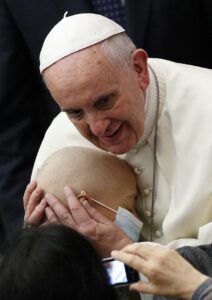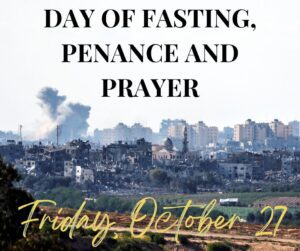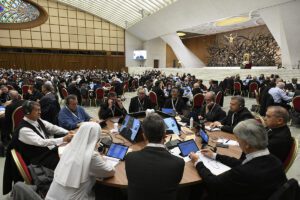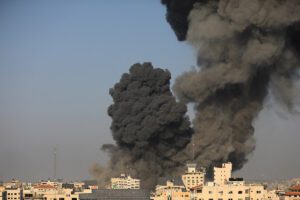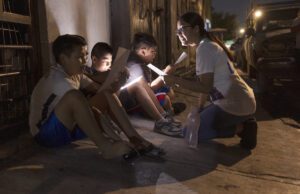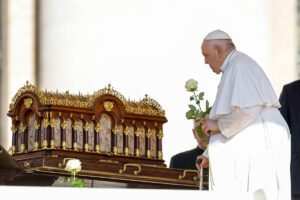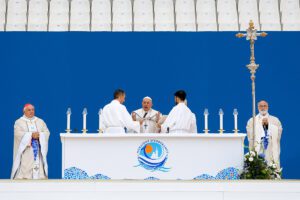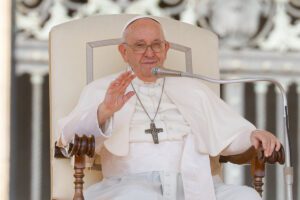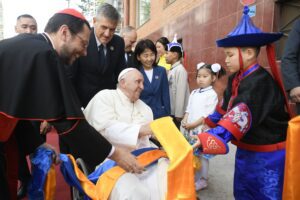ATICAN CITY (CNS) – Pope Francis called for dialogue and cooperation between neighboring nations and appealed for restraint against any actions that could escalate tensions in the Middle East.
After missiles struck Irbil, the capital of Iraq’s autonomous Kurdistan region, Jan. 15 and killed at least four people and wounded six, the pope expressed “my sympathy and solidarity with the victims, all civilians, of the rocket attack.”
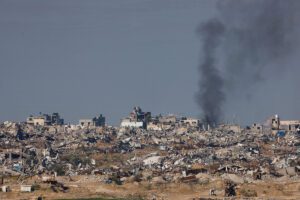
“Good relations between neighbors are not built with such actions but with dialogue and cooperation,” he said Jan. 17 at the end of his general audience in the Paul VI Audience Hall.
“I ask everyone to avoid any step that increases tension in the Middle East and other scenarios of war,” he added.
Iran launched 11 ballistic missiles late Jan. 15 at the Kurdish region in northern Iraq, targeting what it said were Israeli “spy headquarters” in Irbil and launched four other missiles at locations allegedly linked to the Islamic State group in northern Syria, according to the Associated Press.
Cardinal Louis Sako, the Iraq-based patriarch of the Chaldean Catholic Church, said the attack on innocent lives was “reckless and irresponsible,” “a blatant violation of the country’s sovereignty and people’s lives and a grave sin according to Islamic law.”
“The responsibility of states, their forums and peoples is to promote the values of peace and coexistence, and to achieve a dignified and happy life for citizens, and not to create wars and conflicts that do not bring peace,” he said in a statement published on the patriarchate’s website.
“The civilized method for resolving outstanding problems is dialogue, tolerance and mutual respect,” he added.
Meanwhile, Masrour Barzani, prime minister of the Kurdish region, told reporters Jan. 16 while attending the World Economic Forum in Davos, “There is no reason for these attacks and there is no excuse,” according to the AP. “These attacks should not remain without a response.”
At his general audience, the pope asked people to not forget all countries in the world that are at war. “Let us not forget Ukraine, let us not forget Palestine, Israel, let us not forget the inhabitants of the Gaza Strip who are suffering so much.”
“Let us pray for so many victims of war, so many victims. War always destroys, war does not sow love, it sows hatred. War is a true human defeat,” he said.
Lenten Holy Hour with Bishop Bambera
For the second consecutive year, all of the faithful in the Diocese of Scranton are invited to a Lenten Holy Hour with the Most Reverend Joseph C. Bambera, Bishop of Scranton, to commemorate the Year of Parish Revival for the National Eucharistic Revival. These gatherings will take place in each of the twelve deaneries of the Diocese of Scranton.
The Lenten Holy Hour for our deanery, the Scranton Deanery, will take place on Wednesday, March 20, at 7 p.m., at Saint Teresa of Calcutta Parish (Sacred Hearts of Jesus and Mary Church), 1217 Prospect Avenue, Scranton, PA 18505.
During the Year of Parish Revival, which lasts through June 2024, every parish in the country is being invited to offer opportunities to parishioners where they can be healed, converted, formed, and unified by an encounter with Jesus in the Eucharist – and then be sent out on mission “for the life of the world.”
Mark your calendars and plan on joining Bishop Bambera as we pray for renewal in our devotion to Jesus Christ present to us in the Eucharist.

